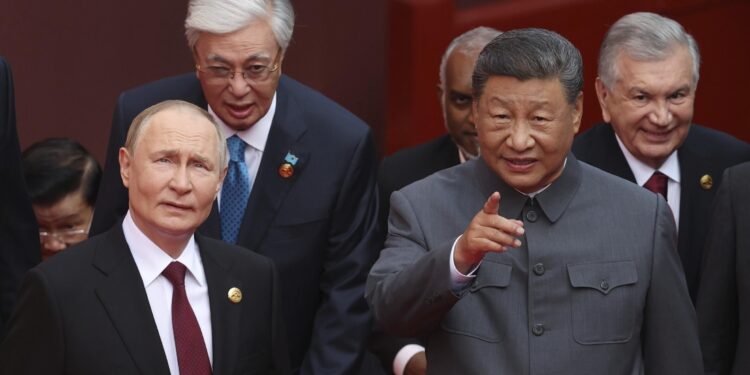China to Impose Temporary Duties on EU Pork Amid Rising Trade Tensions
In a significant escalation of trade tensions, Beijing has announced its decision to impose temporary tariffs on pork imports from the European Union. This move, which is set to impact a key sector in the EU, arises amidst ongoing disputes over trade practices and agricultural policies. The Chinese government cited concerns over food safety and market fairness as primary reasons for the decision, which could further strain economic relations between the two global powers. As the EU grapples with the potential ramifications for its pork producers and overall agricultural export landscape, the decision highlights the increasingly complex interplay of trade, diplomacy, and domestic policy in the world’s second-largest economy.
China’s Temporary Duties Raise Concerns for EU Pork Exporters
China’s recent decision to impose temporary duties on pork imports from the European Union has sent ripples of uncertainty throughout the agricultural community. The new tariffs are designed to address concerns over market distortions caused by a surge in imported pork, significantly affecting the profitability of EU exporters. With many European producers relying heavily on the Chinese market, these tariffs could lead to an unpredictable landscape for trade and pricing.
Industry experts warn that these duties may exacerbate the ongoing challenges faced by EU pork exporters. Key implications include:
- Reduced Competitiveness: EU pork may become more expensive in China, leading to a decline in market share.
- Profit Margins Pressure: Producers may experience tighter margins as they absorb some of the additional costs.
- Potential Market Diversification: EU exporters might need to seek alternative markets to offset losses.
In light of these developments, stakeholders are closely monitoring the situation, hoping for a path to negotiations that could mitigate the impact of these temporary duties and ensure the continued viability of trade relations between the EU and China.
Impact on Trade Relations: Analyzing China’s Decision and Its Ramifications
The decision by China to impose temporary duties on pork imports from the European Union is poised to reshape international trade relations significantly. This move underscores the fragility of global supply chains, particularly in the agricultural sector. As the world’s largest pork consumer, China’s regulatory adjustments could precipitate a ripple effect throughout the EU’s agricultural markets. In response to the increasing global demand for pork and growing concerns over domestic production, China’s duties may lead to:
- Increased prices for EU pork products within China, making them less competitive against domestic alternatives.
- Potential retaliation from EU nations, which might respond with their own tariffs or trade restrictions.
- A strategic reassessment by EU pork producers, leading to shifts in export destinations.
Furthermore, the trade tensions could spark discussions around broader trade agreements. As nations navigate the complexities of tariff implications, both sides may seek alternative partnerships to mitigate the impact. The agricultural sector’s vulnerability highlights an urgent need for:
- Enhanced dialogue between China and EU leaders to address grievances.
- Long-term strategic planning to diversify pork export markets beyond China.
- Collaboration on food security issues, which could reduce dependency on single markets.
Such dynamics illustrate that the stakes extend beyond mere economic transactions, reflecting the interconnections of national policies, food security, and geopolitical stability.
Strategies for EU Farmers: Navigating the Challenges of Increased Tariffs
With China’s recent decision to impose temporary duties on EU pork, farmers across the European Union are facing a challenging landscape that demands immediate and strategic responses. To mitigate the impact of these tariffs, EU farmers need to adapt their operations and consider various tactics to maintain profitability. Key strategies include:
- Diversifying Export Markets: Farmers should explore alternative markets outside China that may offer demand for European pork. Targeting countries with fewer trade barriers can help buffer against the financial pressures posed by the new tariffs.
- Enhancing Product Differentiation: By focusing on quality, sustainability, and unique selling propositions, EU pork producers can create a competitive edge. Emphasizing organic and ethically produced pork may attract premium buyers willing to pay higher prices.
- Engaging in Collaborations: Forming alliances with other farmers and agricultural cooperatives can bolster negotiating power and distribution efforts, facilitating access to new markets and reducing costs.
- Utilizing Technological Innovations: Implementing advanced agricultural technologies can optimize production, reduce costs, and increase efficiency, making EU pork more competitive even with added tariffs.
In light of these developments, it’s crucial for farmers to stay informed about global market trends and regulatory changes. A proactive approach may involve:
| Strategy | Benefit |
|---|---|
| Diversification | Reduces dependency on a single market |
| Quality Focus | Attracts premium customers and markets |
| Collaboration | Enhances market access and reduces costs |
| Technology Use | Improves efficiency and productivity |
Through effective planning and innovative practices, EU farmers can navigate this challenging environment and continue to thrive in the global pork market. By embracing these strategies, they can turn potential setbacks into opportunities for growth and resilience.
Wrapping Up
In conclusion, China’s decision to impose temporary duties on pork imports from the European Union marks a significant move in the ongoing trade dynamics between the two regions. As stakeholders analyze the implications of this policy shift, it raises questions about the future of EU-China trade relations and the impact on global pork markets. With a backdrop of rising tensions and competitive tariffs, both European producers and Chinese consumers may face uncertain repercussions in the coming months. As the situation develops, the international community will be closely monitoring the effects of these duties on bilateral trade and market stability. Further updates will be essential as this story evolves.














